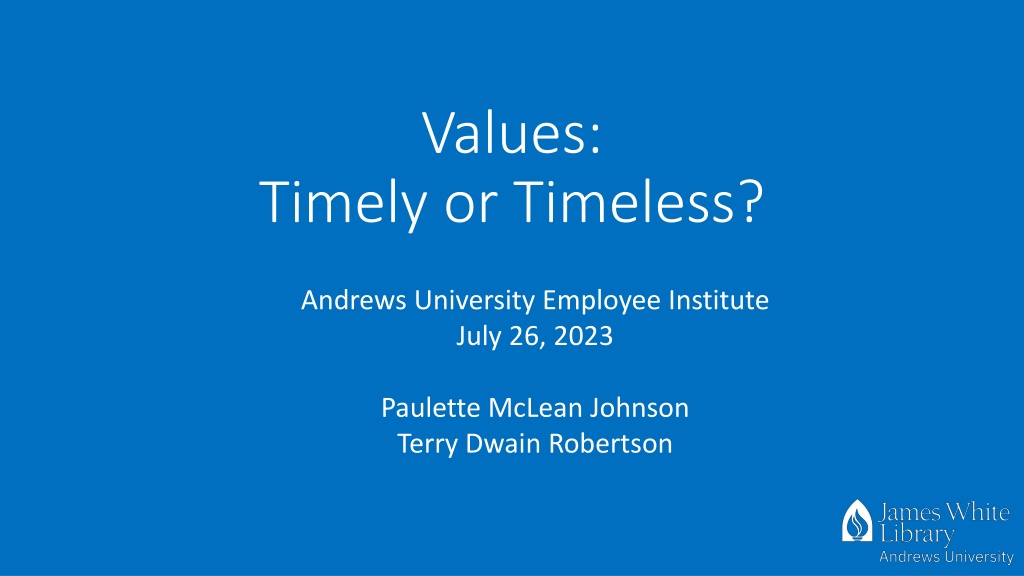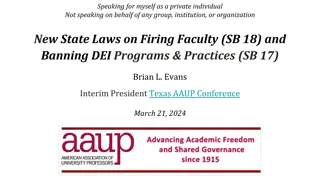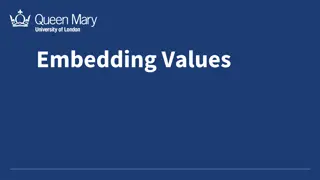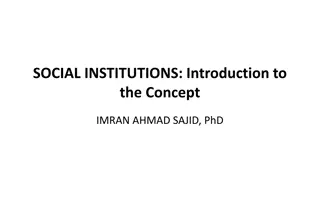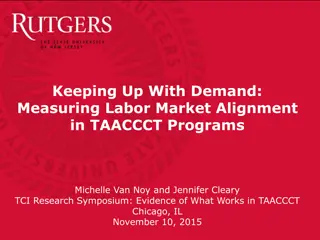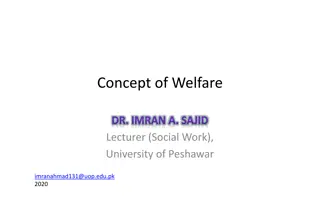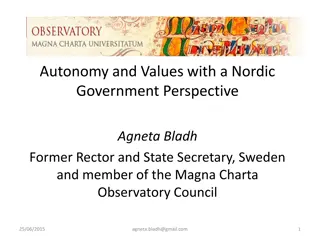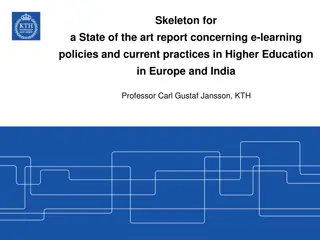Exploring Core Values in Higher Education Institutions
Unravel the importance of core values in higher education institutions, examining the interplay between organizational culture, decision-making processes, and the alignment of values with faith and professional beliefs. Delve into the diverse types of values, from permission-to-play to aspirational values, shaping the ethos and behavior within such institutions amidst cultural challenges and tensions.
Download Presentation

Please find below an Image/Link to download the presentation.
The content on the website is provided AS IS for your information and personal use only. It may not be sold, licensed, or shared on other websites without obtaining consent from the author. Download presentation by click this link. If you encounter any issues during the download, it is possible that the publisher has removed the file from their server.
E N D
Presentation Transcript
Values: Timely or Timeless? Andrews University Employee Institute July 26, 2023 Paulette McLean Johnson Terry Dwain Robertson
VALUES: TIMELY OR TIMELESS VALUES: TIMELY OR TIMELESS?
DEFINITIONS DEFINITIONS Mission statement: A brief statement that describes an organization's purpose and overall intention. WHY WE EXIST. Andrews University, a distinctive Seventh-day Adventist institution, transforms its students by educating them to Seek Knowledge and Affirm Faith in order to Change the World.
DEFINITIONS DEFINITIONS Vision statement: An aspirational statement that creates a mental image of the ideal state that the organization wishes to achieve. WHERE WE ARE HEADED. World Changers made here. https://www.andrews.edu/about/mission/index.html
DEFINITIONS DEFINITIONS Values are the core beliefs and ideals that guide and direct the organization and its culture and creates a moral compass that is shared by the organization and its employees. Values define what is good and desirable for the organization. They are the foundation of thoughts, feelings, attitudes, and policies within the organization and act as commonly held bases for those attitudes and policies. In psychological terms, values represent the way that members of the college or university define themselves within the library, the campus, and the wider society. HOW WE OPERATE AND BEHAVE.
TYPES OF VALUES TYPES OF VALUES Permission-to-play values: Minimum behavioral and social standards required. For example, integrity. Accidental values: Arise spontaneously and reflect the common interests or personalities of employees. Can be positive or negative forces. Core values: We ve focused on these fundamental values that guide all behaviors and determine the culture of the institution. Aspirational values: Point to the what the institution /department needs to succeed in the future. (Lencioni, 2002)
PROBLEM STATEMENT PROBLEM STATEMENT Higher education in the United States is caught in the crosshairs of an ongoing culture war related to issues of history, diversity, complexity, and ambiguity. As Christians we too may experience conflict between the values of our profession and our fundamental beliefs. However, the profession and our faith share a commitment to nurturing relationships and providing optimal service. Since our institutions are not exempt from these complex issues, What are some of the core values that determine how we operate and make decisions about personnel, policies, practices, and services? How do these values define our organizational culture?
U.S. HIGHER EDUCATION CONTEXT U.S. HIGHER EDUCATION CONTEXT Covid-19 pandemic George Floyd and other unharmed Black Americans Polarized politics - January 6 insurrection Technological advancements - Virtual reality, augmented reality, artificial intelligence Changing student demographics, First Generation college students , nontraditional, online, and more. Workplace readiness movement: academic/business partnerships, alternative credentials, non- degree requirement from major corporations. Rising tuition and student debt crisis; benefits of college education (especially liberal arts) questioned. Emphasis on STEM, credentialling, workplace training, and developing soft skills. Flat and decreasing enrollments Culture wars Diversity Equity and Inclusion initiatives (race, gender, religion), climate change, book banning, and the growing backlash to various responses to these issues .
METHODOLOGY METHODOLOGY Review of national and international library organizations values statements. Review of SDA colleges & universities accredited by AAA library websites for documentation about their values/values statement. One hundred and nine SDA academic library websites were searched between April and May 2023.
SOME CORE VALUES SOME CORE VALUES American Library Association, 2019 Access Confidentiality/privacy Democracy Diversity Education and lifelong learning Intellectual freedom Preservation The public good Professionalism Service Social responsibility Sustainability Michael Gorman (Our enduring values revisited, 2015) Stewardship Service Intellectual Freedom Rationalism Literacy & learning Equity of access Privacy Democracy The Greater Good
RESULTS RESULTS Academic libraries websites document library mission and sometimes, vision statements, library regulations, and library code of conduct. Academic libraries assume their institutions values or values statement; they are simply taken for granted- understood as given. The libraries do not distinguish between library mission and library values. However, library specific value statements are almost non-existent.
Adventist Accreditation Association Adventist Accreditation Association Accredited SDA Colleges & Universities Accredited SDA Colleges & Universities 109 colleges & universities websites and library websites University mission & vision statements visible on most pages University values evident on 17 websites Common recurring values: Excellence Integrity Service Stewardship
SDA ACADEMIC LIBRARY VALUES Biblioteca Norma Gracia de Sanchez, Universidad de Navojoa, Mexico Our Values: Love:It is the fundamental and motivating principle of all educational and service activities, as well as interpersonal relationships that favor an atmosphere of acceptance and respect. Commitment: It is the attitude with which you face every challenge and opportunity in life, as well as your adherence to Adventist principles and mission. Integrity: It is the virtue that should distinguish all our students, graduates, and staff, in situations that demand loyalty to Christian principles and ethics.
SDA ACADEMIC LIBRARY VALUES Biblioteca Norma Gracia de Sanchez, Universidad de Navojoa, Mexico Our Values: Responsibility: It is the determination to accept the consequences of one's own decisions, ensuring that they are based on the principles of the Word of God. Service: It is the willingness to give the best of oneself by promoting the well- being of others, the aggrandizement of society and care for the environment. Health: Applying the principles involved to promote a healthy lifestyle in the physical, mental, social and spiritual areas is of the utmost importance for the fulfillment of our mission.
SDA ACADEMIC LIBRARY VALUES SDA ACADEMIC LIBRARY VALUES Andrews University, Berrien Springs, Michigan, United States of America. Innovation: Proactively improve resources and services to better meet the needs of campus and the wider community. Integrity: Be honest and fair in all that I do. Justice: Commit to identifying and seeking to change injustice and inequity in the University community. Trust: Assume the individuals around me are working with me and for me for the fulfillment of the University s mission/purpose. Wellbeing: Actively optimize every aspect of my life to harmoniously reflect my Creator.
SDA ACADEMIC LIBRARY VALUES SDA ACADEMIC LIBRARY VALUES Andrews University, Berrien Springs, Michigan, United States of America. Compassion: Empathize with the needs and concerns of others. Humility: Seek the best for others before thinking of my own needs as referenced in Ephesians 4:32, And be kind to one another, tenderhearted, forgiving one another, even as God in Christ forgave you. Library agreed to add: Collaboration: Work as a team to build consensus, deliver optimum service and resources, solve problems, and accomplish common goals Competency: Critical thinking/problem solving; teamwork/collaboration, professionalism/work ethic; oral/written communication. Professionally trained personnel to meet the social needs and academic goals of the library. Hospitality: Friendly and generous reception and entertainment of guests, visitors, or strangers.
SUMMARY SUMMARY Source: Source: https://www.batonglobal.com/post/how-to-write-mission-vision-and-values-statements-with-examples
WHY ARTICULATE VALUES WHY ARTICULATE VALUES? 80% of employees find it extremely important to work with an organization that has a defined set of values. 62% of employees surveyed work for an employer with a value statement Only 39% of those employers publicly share their values (Perry, 2023). Explicit. May be assumed and taken for granted. Builds community, internally and externally. Provides guidance for decision-making. Serves as a social contract. BUT THERE IS MORE...
WHY ARTICULATE VALUES? Social contract or sociality : The broad range of ways humans interact with one another, form relationships, and engage in collective activities. QUESTION: Do we act based on personal reasons (I-mode) or are there times when we act with a shared intention (We-mode)? 2 Peter provides one framework or set of lens through which we can answer this question.
2 Peter 1: 2 Peter 1: Community Identity--Discipleship a. Divine omnibenevolence b.Participating in the divine nature i. Sharing divine values, character traits ii.Sharing the divine motivations c. Values/virtues of those who accept the call to discipleship. i. Affective habits of mind that find expression in all areas of living. ii.Most reflective of common understandings of sociability iii.Love as habit of mind elevates sociability to valuing others as God values them. d.Reliable sources Scriptures as light
2 Peter 2: 2 Peter 2: Threats to Community a.Greed b.Oppression c.Addiction d.Accountability i.Influencers who incite to vices cannot escape accountability in the judgment. ii.God knows how to keep the godly safe from these influencers.
2 Peter 3: It Makes a Difference a.Inevitability the earth will be cleansed of all that is evil b.Outcome: a place where righteousness dwells c.God s Patience = opportunities for salvation d.Stay safe and grow in grace and knowledge of Jesus
Making Sense of Discipleship Metaphors from the contemporary culture a.Early Church Slavery defining moment: purchased by the Blood of the Lamb, redeemed b.Reformation Era Warfare defining moment: surrender of the will to God, battle against sin c.21st Century Sociality: we-mode vs. I-mode defining moment: believe the promise and escapefrom corruption
Framework for Disciples in the Workplace a. Grow in knowledge of the heart of God i. Relational ii.Performative iii.Consequential b.We-mode engagement in the values and objectives of the heart of God i. Heart of God embracing people, success measured by wholistic flourishing of everyone, rejecting performative measures that reduce people to behaviors. ii.Redemption-focused, never condoning greed, oppression, and addiction. c. Motivations and desires aligned with the heart of God towards everyone
CONVENTIONAL SOCIABILITY Positive traits or behaviors expressed as: Faith Virtue Knowledge Self-control Endurance Piety Mutual affection trustworthiness excellence competence reliability persistence respectfulness collegiality Trust Wellbeing Innovation Integrity Justice Compassion
Our Values: Sharing the Heart of God Beyond Sociability The Discipleship Difference Love sharing the heart of God, a we-mode disposition desiring the best for the other person (leaders, followers, colleagues, students/customers/clients, family, vendors, community,strangers).
Application to Policies and Procedures a.Disagreements grounded in history, diversity, complexity, and ambiguity. b.Leadership accountability c.Trust in God s Goodness
REFERENCES REFERENCES AdventHealth University https://www.ahu.edu/about-ahu/mission-vision-and-values Del Webb Library Loma Linda University Health. https://library.llu.edu/about/mission-and-vision Gorman, M. (2015). Our enduring values revisited. Librarianship in an ever-changing world. American Library Association. Lencioni, P.M., (July 2002). Understand the different types of values. Harvard Business Review. Pasquerella, L. (2023). What we value? Public health, social justice, and educating for democracy. University of Virginia Press. Perry, E. (March 2, 2023). Writing a value statement: your guide to keeping yout team aligned. Rea, P.J., Stoller, J.K., & Kolp, A. (2018). Exception to the rule: The surprising science of character-based culture, engagement, and performance. McGraw Hill Education. Seventh-day Adventist Colleges & Universities Accredited by the AAA ( May 9, 2023). Stefani, J. (2003). Values, worldview, and faith. Journal of Adventist Education, Oct/Nov., 38-42. Tuomela, R. (2007). The philosophy of sociality. The shared point of view. Oxford University Press.
